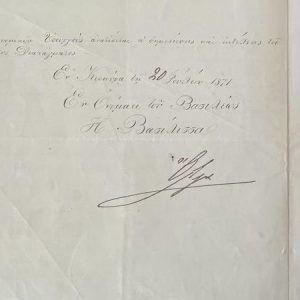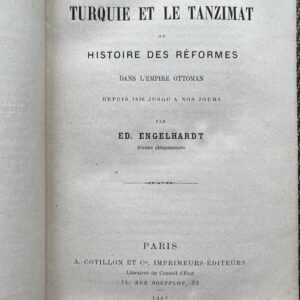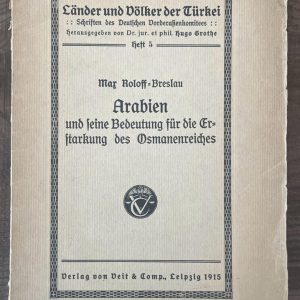Russia in Central Asia in 1889 and the Anglo-Russian Question, First Edition, G. Curzon MP
480.00€
First Rare Edition!
Ex Libris Edward Fitzgerald Law!
Description
Russia in Central Asia in 1889 and the Anglo-Russian Question
By Hon. G. Curson, MP
published by Longmans, Green, and Co, London, 1889
xxiii, 477 p. + 24 p.
Catalogue of books from Longmans, Green. 23 cm.
2 folding colour maps, 16 full-page illustrations, and numerous b&w illustrations within the text.
Blue cloth hardcover with gold impressing. Hinges tender. Some wear to spine ends.
Owner’s inscription on white 1st page (Edward Fitzgerald Law).
Topics include: Russian railways to the Caspian; Russian designs upon India; observations on Russian character; hostility to Germany and the Germans; Russian feeling towards England, Austria, France; the Anglo-Russian question; merits and demerits of Russian rule; Russian military strength; bravery and endurance of Russian character. The author traces a journey from London to the Caspian, along the Transcaspian Railway; from the Caspian to the Merv; from Merv to the Oxus; Bokhara the Noble; Samarkand and Tashkent.
Ex Libris Edward Fitzgerald Law!
Edward Fitzgerald Law (2 November 1846 – 2 November 1908) was a British diplomat and expert in state finance.
Law first went to Greece in 1892, and presided over the finances of Greece, restructuring the Greek debt and the nation’s economy, to the lasting advantage of Greece.
The Greek treasury had been depleted by over-spending and systemic corruption often caused by political campaigns in which parties promised massive spending programmes. The reformist Prime Minister, Charilaos Trikoupis (Χαρίλαος Τρικούπης, 1832-1896), stood before parliament and made the most famous statement of his career: ‘Regretfully, we are bankrupt’ («Δυστυχώς επτωχεύσαμεν»).
In 1893, Greek taxation was moderate in comparison to many other European countries. Law suggested increasing it, along with introducing reforms in the imposition and collection of new taxes. He regarded a new loan for Greece as a necessity, but the operation was to comprise funding the floating debt, and reducing the circulation of Greek banknotes during the three following years.
Law’s report was leaked in the City in London before it was published, causing considerable speculation in Greek stocks. This ‘regrettable incident’ was attacked in the London daily newspapers, and Law was subjected to some unmerited censure.
However, his report helped restore public confidence in Greece, the servicing of foreign loans was suspended, and all non-essential spending was cut. Some of the results Law might have been expected were frustrated by the untimely fall of Trikoupis and his reformist government.
At a party at the German Embassy there he met Catherine (Kaity), only daughter of Nicholas Hatsopoulos. She was the descendant of an old Byzantine family that was long-settled in Athens. Edward and Kaity were married on 18 October 1893.
In 1894, Kaity was the model for an image of Athens on a medallion struck for Queen Victoria’s daughter, the Empress Frederika (1840-1901), wife of Kaiser Frederick III.
Law stayed on in Greece, and in 1897 he was appointed the British member or commissioner on the International Financial Committee at Athens. He remained the British Minister Resident in Athens from 1898 to 1900.
Source: https://www.patrickcomerford.com/2017/11/sir-edward-law-1846-1908-irish.html
Additional information
| Languages | English |
|---|















